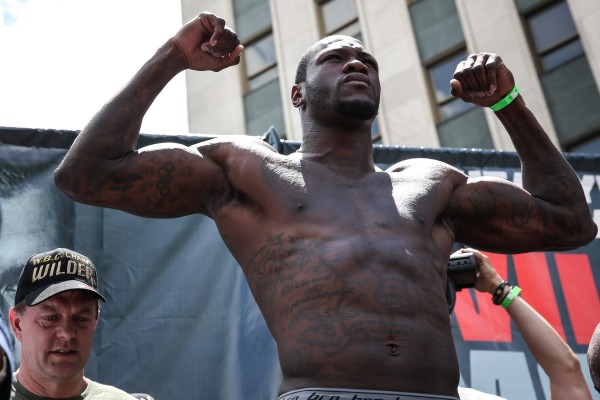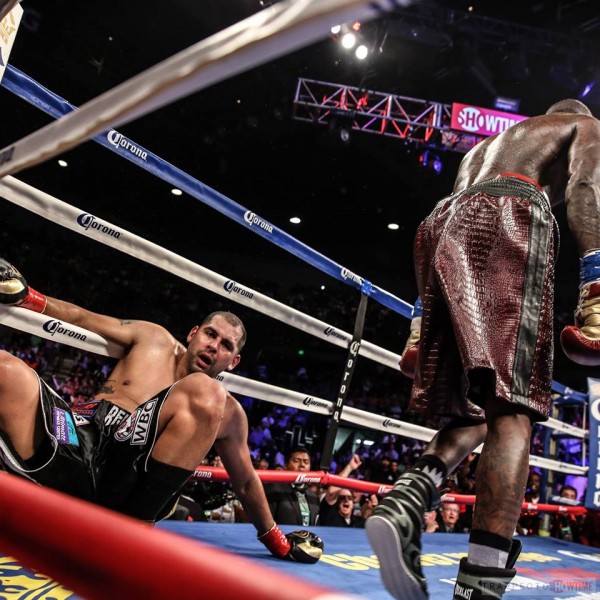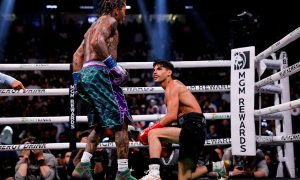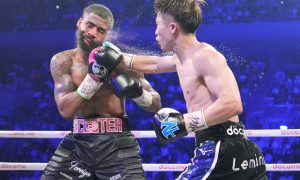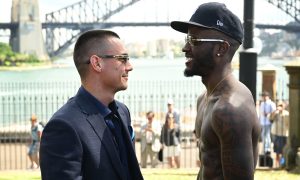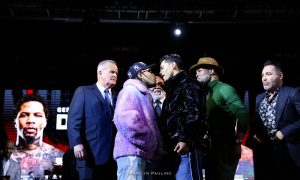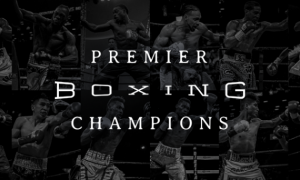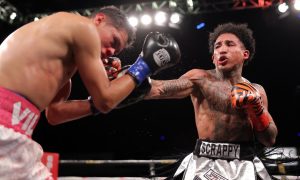future [fyoo-cher] noun 1. time that is to be or come hereafter. 2. something that will exist or happen in time to come: The future is rooted in the past. 3. a condition, especially of success or failure, to come: Some people believe a gypsy can tell you your future.
Deontay Wilder’s career couldn’t have started any better if it was pre-ordained. He has reeled off 34 straight victories without a loss, has a 97% knockout ratio and is the proud owner of the WBC strap.
He sits upon the throne observing his loyal subjects in the kingdom of “Bomb Squad,” crown cocked to the left just over a furrowed brow surmising how his career will unfold.
2. something that will exist or happen in time to come:
The future is rooted in the past.
Wilder was born in 1985. This is the same year that another future Heavyweight champion and fellow knockout artist, Mike Tyson, turned professional with 15 straight stoppage victories. At that point it was unknown how long success would last, and in his case it was inconceivable that it could end any way but of his choosing.
Time, however, reveals all.
While having similar beginnings to their prospective careers, their paths separate as one of their tales has yet to be written.
The 6’7″ Wilder has been dominant to this point of his story, though has been roundly criticized for the level of competition against which much of his success has come.
Commanding victories over faded name opponents Owen Beck, Audley Harrison and Sairhei Liakhovich did nothing to dispel that notion, and a dubious knockout of Malik Scott added fuel to the fire.
This changed for a moment with an impressive showing against recently crowned, hard punching WBC heavyweight champion Bermane Stiverne (24-1, 21). Wilder showed previously unknown boxing ability and stamina going the distance for the first time, usurping the crown by unanimous decision and becoming the first American heavyweight champion in a decade.
Unranked school teacher Eric Molina (23-2, 17) nearly taught Wilder a lesson in his first defense in front of a hometown crowd in Birmingham, Alabama when he was clipped with a left hook that momentarily buckled his knees.
Wilder quickly recovered and the expected result was realized when referee Jack Reiss stopped the fight in Round 9, but the fight raised far more questions than it answered.
There are many appealing potential opponents with which he can be matched. His combination of size, power, personality and vulnerability would make a defense against a top 10 contender well worth the price of admission.
3. a condition, especially of success or failure, to come:
Some people believe a gypsy can tell you your future.
Speaking of which, a voluntary defense against Irish Traveller Tyson Fury (24-0, 18), should he upset champion Wladimir Klitschko (64-3, 53), would perhaps be Wilder’s best chance to impress his detractors in a unification bout.
While there is certainly no shortage of questions about Fury as well, he would be the highest rated fighter aside from Stiverne that Wilder has faced to date. At the very least, the press conferences and lead up to the fight would provide innumerable soundbites.
Lucas Browne (22-0, 19) is world-ranked and the hungry fighter from Down Under would be a dangerous match for the titleholder. It would be interesting to see if Wilder can survive a chin check from a big puncher like “Big Daddy,” though he did show good whiskers against the heavy handed Stiverne.
Perhaps a match against Bryant Jennings (19-1, 10) would help to define Wilder’s reign, especially if he was able to stop the challenger. In Jennings’ most recent outing, he gave a spirited effort against Wladimir Klitschko in a bout in which many believed that he would be demolished while losing a 12-round decision.
The opportunity to establish affirmation of Wilder’s regime is bountiful in the heavyweight ranks. Interestingly enough, most of the contenders that would help legitimize his claim would also be called “cherries” if Klitschko were to fight them.
This is a testament not only to Klitschko’s long time dominance of the division, but of Wilder’s perceived vulnerability. We will likely learn more about that soon.
1. time that is to be or come hereafter.
For Wilder to advance toward dominance, he will have to conquer his first mandatory challenger, the hard hitting Alexander Povetkin (29-1, 21). Povetkin is coming off a crushing first-round knockout victory over durable Mike Perez and has his sights on taking Wilder’s belt.
Should he beat the Russian convincingly, there is a very real chance that he will set the stage for an intriguing unification match with Klitschko. Even if Wilder were to lose to the 39-year-old Ukrainian but acquit himself well, he would still be in a good position as heir to the throne.
A win would of course cement his future as a player for the foreseeable future in the division and we would look forward to speculating on future bouts with young guns like Anthony Joshua (13-0. 13), Dillian Whyte (14-0, 11) and others.
Deontay Wilder is absolutely the future of the heavyweight division; only time will tell by which definition.





